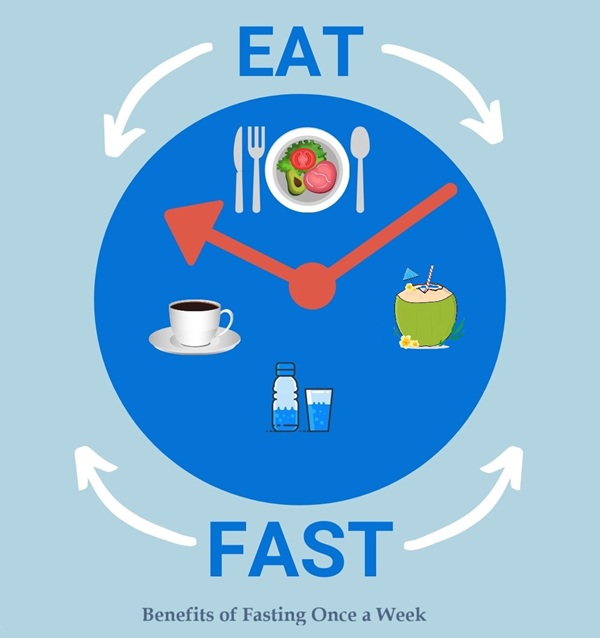Fasting has been practiced for centuries for religious, spiritual, and health reasons. Recently, science has started backing up what many ancient traditions have known all along—fasting can be incredibly beneficial for your body and mind. If you fast once a week with only water, your body undergoes significant changes that can improve your metabolism, detoxify your system, and even slow aging.
But while fasting offers many advantages, it’s not for everyone. In this blog, we’ll explore benefits of 24-hour fast once a week, what happens to your body when you fast once a week, the long-term benefits, and who should avoid fasting.
What Happens to Your Body When You Fast?
When you consume only water for 24 hours, your body enters a state of fasting, triggering several physiological changes:
- Insulin Levels Drop
One of the first things that happen during fasting is a drop in insulin levels. Insulin is a hormone that regulates blood sugar, and lower insulin levels help your body become more sensitive to it. This, in turn, reduces the risk of type 2 diabetes and promotes fat burning. - Glycogen Depletion and Fat Burning Begin
Your body primarily runs on glucose (sugar) for energy. When you stop eating, your liver stores of glycogen start depleting, forcing your body to turn to fat stores for energy. This is why fasting is often linked to weight loss. - Increased Autophagy (Cellular Cleaning Process)
Fasting initiates autophagy, a process where cells remove damaged components and recycle them for energy. This helps in detoxification, slows aging, and may reduce the risk of diseases like Alzheimer’s and cancer. - Improved Digestion
Since your digestive system gets a break, it has time to heal and reset. This can help with bloating, gut inflammation, and overall digestive efficiency. - Mental Clarity and Focus
Fasting increases norepinephrine levels and stimulates the production of BDNF (Brain-Derived Neurotrophic Factor), which enhances cognitive function and mental clarity. Many people report feeling more focused and alert while fasting.
Also Read: Shopping Malls Near Sector 62 Noida
Long-Term Benefits of Fasting Once a Week
If you make weekly fasting a habit, your body adapts and the benefits extend beyond the short-term effects. Here are some of the long-term advantages:
1. Sustainable Weight Loss
By fasting once a week, you create a calorie deficit and encourage your body to burn fat stores. Unlike extreme diets, fasting doesn’t slow your metabolism, making weight loss more sustainable.
2. Reduced Risk of Chronic Diseases
Regular fasting helps lower inflammation, which is a major cause of chronic diseases such as heart disease, diabetes, and even some cancers.
3. Better Heart Health
Studies show that fasting can lower cholesterol levels, reduce blood pressure, and decrease triglycerides, all of which contribute to a healthier heart.
4. Increased Longevity
Due to autophagy and reduced oxidative stress, fasting may slow the aging process and increase lifespan. Many longevity researchers advocate intermittent fasting as a powerful tool for healthy aging.
5. Enhanced Immune System
Fasting encourages the regeneration of immune cells. It helps the body eliminate old, damaged immune cells and create new ones, making your immune system stronger over time.
6. Improved Emotional and Spiritual Well-Being
Fasting is often linked to spiritual and emotional clarity. Many people report feeling more connected to their thoughts and emotions, which can help with stress management and mindfulness.
Fasting is often linked to spiritual and emotional clarity. Many people report feeling more connected to their thoughts and emotions, which can help with stress management and mindfulness.
How to Do a 24 Hour Fast
If you’re new to fasting, it’s important to ease into it gradually to make the transition smoother. Start with intermittent fasting, such as the 16:8 method, where you fast for 16 hours and eat within an 8-hour window, before attempting a full 24-hour fast. Staying hydrated is crucial—drink plenty of water and consider adding a pinch of salt to maintain electrolyte balance.
When breaking your fast, do so gently by choosing light, nutrient-dense foods like soups, fruits, and vegetables to prevent digestive distress. Always listen to your body; if you feel weak, dizzy, or extremely unwell, it’s okay to break your fast. Lastly, if you have underlying health conditions, consult a healthcare professional before making fasting a regular practice.

What to Eat After 24 Hour Fast
Breaking your fast the right way is crucial. Here’s what you should eat after completing a 24-hour fast:
* Start with Water and Electrolytes – Rehydrate your body before consuming any solid food.
* Bone Broth or Light Soups – These provide essential nutrients without overwhelming your digestive system.
* Easily Digestible Fruits and Vegetables – Opt for bananas, berries, or steamed vegetables.
* Healthy Fats and Proteins – Nuts, seeds, eggs, and lean meats can be included gradually.
* Avoid Heavy or Processed Foods – Greasy, fried, and processed foods can cause digestive discomfort after fasting.
Who Should Avoid Fasting and Why
While fasting once a week is generally safe for most healthy individuals, there are certain groups of people who should be cautious or avoid it altogether:
A. Pregnant and Breastfeeding Women
Pregnant and breastfeeding women need a constant supply of nutrients for their baby’s development and milk production. Fasting can lead to deficiencies that may affect both mother and child.
B. People with a History of Eating Disorders
Fasting can trigger unhealthy behaviors in people who have struggled with anorexia, bulimia, or binge eating. If you have a history of disordered eating, it’s best to consult a healthcare professional before fasting.
C. People with Diabetes or Low Blood Sugar Issues
Individuals with diabetes or hypoglycemia (low blood sugar) need to maintain stable blood sugar levels. Extended fasting can cause dangerous drops in blood sugar, leading to dizziness, confusion, or fainting.
D. People on Certain Medications
Some medications require food to be properly absorbed, while others (like those for blood pressure or diabetes) can lead to complications if taken without eating. Always check with your doctor before fasting if you’re on medication.
E. Underweight Individuals or Those with Malnutrition
If you are already underweight or suffering from malnutrition, fasting can worsen your condition by depriving your body of essential nutrients.
F. People with Intense Physical Jobs or Athletes in Training
If you have a physically demanding job or are an athlete undergoing intense training, fasting may reduce your energy levels and impact performance. In such cases, modified fasting (such as consuming electrolytes or broth) may be a better option.
Conclusion
Benefits of 24-hour fast once a week are numerous, from weight management and metabolic benefits to enhanced mental clarity and longevity. However, it’s not suitable for everyone, and those with medical conditions or special dietary needs should proceed with caution. If done correctly, weekly fasting can be a sustainable and beneficial practice for long-term well-being.
Have you tried fasting? Share your experiences in the comments below!
